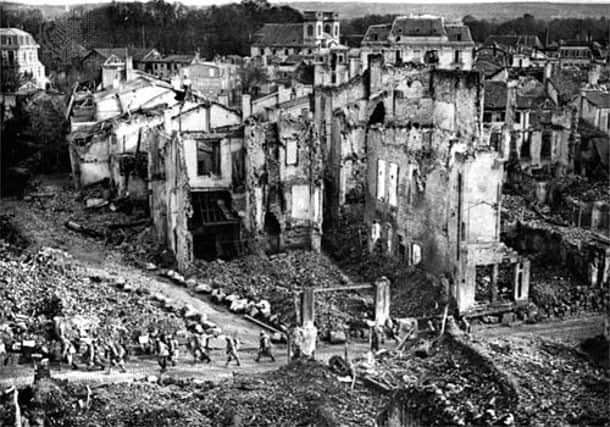John's WWI Blog: The hell of Verdun


Verdun. Even today, 100 years after the longest battle of the First World War, that single word strikes a sombre note in the heart of every French man and woman.
Verdun is the British equivalent of the Somme, both battles ferociously fought over just a relatively few, short miles, but which killed and injured enormous numbers of young men.
Advertisement
Hide AdAdvertisement
Hide AdAnd that’s why the March 21, 1916, edition of the Market Harborough Advertiser carries a full column of news about the German onslaught of the French positions.
It is perhaps also why there is not another single report from the Front involving British soldiers, let alone young men from Market Harborough. The edition is dominated by politics. The resignation of Harborough MP J W Logan has forced a by-election that is mentioned on every one of the edition’s eight pages.
But, what is interesting about the articles on Verdun – sourced from mainstream journalists writing for the French national papers like Le Figaro – are similar in tone and style to reports sourced for Fleet Street publications.
The stories are written almost as chapters in a novel – literary in sweep, short sentences to punctuate the rhythm of the prose, language verging on the poetic, with many first person exhortations. Every conceivable trick is used to convey the ‘excitement’ of the battle without actually describing any of the pain and blood that always accompanied the dreadful slaughter of the First World War.
Advertisement
Hide AdAdvertisement
Hide AdThis is a typical example from a story on page 4 simply entitled ‘Verdun’.
“What a terrible struggle! And oh! What troops! At times a man falls, rises again. Walks, fires, runs, fires again and still again, then the real combat with cold steel begins; he becomes exhausted, falls, is trampled underfoot, but utters no cry.”
What makes local papers like the Market Harborough Advertiser so different to the national press of both Britain and France is that they can often source their stories from the much more intimate and evocative language of the ordinary soldier in letters to their loved ones at home.
This, it seems, is no different to the letter writing skills of the ordinary French soldiers, according to the author C N Trueman in his book The Battle of Verdun (http://www.historylearningsite.co.uk/world-war-one/battles-of-world-war-one/the-battle-of-verdun/).
Advertisement
Hide AdAdvertisement
Hide AdTrueman quotes a French soldier’s description of the fighting in a letter home. “Men were squashed. Cut in two or divided from top to bottom. Blown into showers; bellies turned inside out; skulls forced into the chest as if by a blow from a club.”
And here is another.
“You eat beside the dead; you drink beside the dead, you relieve yourself beside the dead and you sleep beside the dead. People will read that the front line was Hell. How can people begin to know what that one word – Hell – means.”
The journalist’s report for Le Figaro and reproduced by the Advertiser is almost written for the stage, to make the audience gasp and clap and cheer on the hero but in no way conjures up the horrors the fighting caused for the ordinary soldier. No blood is spilt.
However, Trueman’s soldiers are not describing a plot line for the music hall, there’s no rallying cry for the gallantry of our brave boys, there’s just horrific descriptions of young men dying in an unimaginable way.
Advertisement
Hide AdAdvertisement
Hide AdThe Battle of Verdun, which began in late February, continues until December 1916 with a French victory made partly possible by the huge British assault at the Somme in the summer which forced the Germans to split their troops to fight on two fronts.
It will be interesting to see how the Advertiser covers the horrors of the Somme through the words of the Harborough lads dragged into that battle.